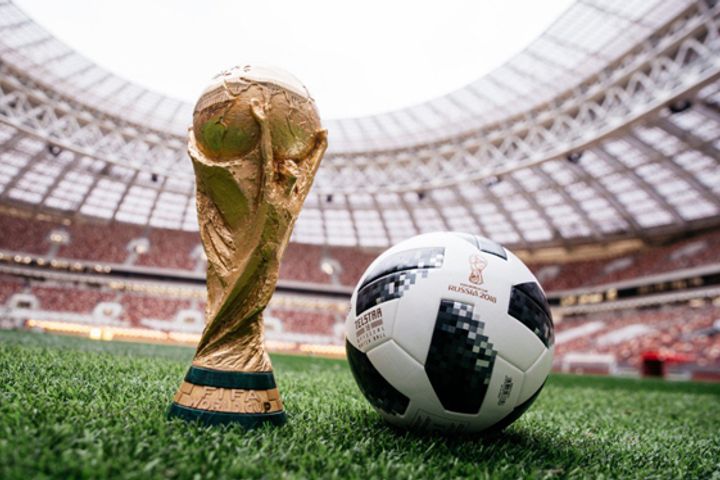 Chinese Companies Siphon Spectacular Sponsor Profits From World Cup
Chinese Companies Siphon Spectacular Sponsor Profits From World Cup(Yicai Global) July 5 -- Companies are adopting various marketing approaches and assuming sky-high advertising expenditures to tap into the marketing effectiveness of the World Cup.
Concerns from various countries have spent USD2.4 billion on advertising during this year's World Cup, with Chinese firms forming the majority with USD835 million -- over twice that of American companies (USD400 million), and far higher than Russian firms' USD64 million, the latest data by market researcher Zenith shows.
Chinese companies that lavished on advertising did make a splash during the event.
Chinese home appliance giant Hisense Group serves as the official sponsor for 2018 World Cup Russia, while TCL had football star Neymar as its global endorser, and Sichuan Changhong Electric is Belgium's sponsor.
As the first Chinese consumer electronics brand appearing on the list of World Cup sponsors since the competition kicked off almost a century ago, Hisense's presence at the event is overwhelming this time. In addition to its the green logo appearing on the field, it is also visible on tickets and score popups.
Hisense spent almost USD100 million on World Cup sponsorship. Nevertheless, reaping the benefits of almost 100 million exposures, it confidently asserted that this sum has yielded it handsome returns without losses.
As the games started, the brand effect of the World Cup has begun to show initial results. Hisense's sales have exploded in Russia, up almost 300 percent in only half a month to hit a new high.
TCL's TVs
TCL is now also actively expanding its market in the country. The scale of the TV market in Russia will hit over six million units this year, Wang Cheng, the firm's senior vice president, told Yicai Global.
As a major country with a population of 145 million, Russia offers considerable potential market. After years of effort, the further expansion of its Russian business is now a key task for TCL.
"Along with the further expansion of our business, Russia still holds forth promising development scope in areas like the export of intelligent manufacturing products and cooperation in internet content," he said.
TCL's sales in Russia this year were up 30 percent thanks to the star effect of Neymar. This is twice as much the industrial average level, per the latest statistics by Churikov, TCL's exclusive selling agency in Russia.
Yet Chinese firms are also flustered. "In fact, no matter sponsoring the World Cup itself or sponsoring broadcast platforms, the maximum of companies' brand influence still relies on their fortune, for such business activities like gambling activities are hard to quantify precisely," said the head of a company that once sponsored the World Cup.
Endorsers serve as an example. Cristiano Ronaldo and Lionel Messi, both top soccer stars, earned over GBP23 million (around CNY200 million, USD31 million) each from endorsements in 2016.
Tragic Comedy
"It is a tragedy in audience's eyes. After these great stars like Messi and Ronaldo left their commercials became farcical," said a football fan named Tang Rong.
"I only want these commercials to stop being so annoying," said Tang, a fan staying up to watch games who cannot help complaining. As the World Cup this year has seen various dark horses, the failure of those supposedly strong teams like Germany, Argentina, Portugal and Spain has already proven a bitter draft for Tang. To make matters worse, many halftime commercials are really irritating and subliminal. "These ads just make me want to smash the screen," he said.
It is thought-provoking that the brand influence of the World Cup itself has become so different from eight years ago.
The sensational scandal about Federation International Football Association corruption came to light at that time, and several senior FIFA officials were arrested, including Sepp Blatter, its then-chairman. As this case simmered, many international brands got cold feet, worrying that their further sponsorship of FIFA might backfire on their brand images.
After the 2014 World Cup Brazil came to an end, many brands like Sony, Emirates Airlines, Continental, Johnson & Johnson, and Castrol did not renew their contracts with FIFA after their expiration.
The organization reformed its sponsorship system, whereby the 'regional supporter' that was only open to host countries of the World Cup is now available for four companies in each of the five major regions globally.
"That is said to be the real reason why half of these sponsors are Chinese firms. Nevertheless, given the current situation, most Chinese brands still focus on their domestic markets, though some leading companies have turned to wider overseas markets. For Chinese brands, World Cup sponsorship is a shortcut to exposure to global consumers," said Ling Ping, editor-in-chief of Advertising Pointer in an interview with Yicai Global.
As the potential returns become ever more evident, Chinese corporate dominance in World Cup sponsorships is likely to only gather further momentum in the future.
Editor: Ben Armour